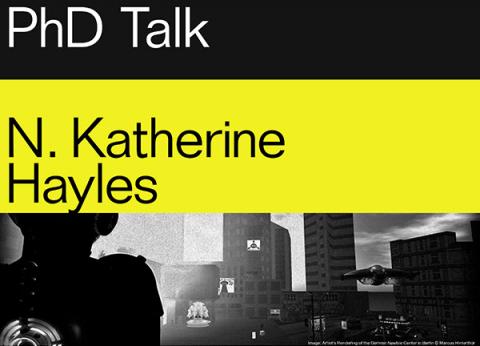School of Architecture PhD Talk - N. Katherine Hayles, "Addressing Space: Augmented, Enfolded and Exfolded Hybrid Models and Their Implications"

Addressing Space: Augmented, Enfolded and Exfolded Hybrid Models and their Implications
Ranjodh Singh Dhaliwal argues that “addressability”—the ability to address and be addressed—is the foundational requirement for computability. Addressability, whether for houses, analogue computers, von Neumann architectures, or quantum devices, consists of mechanisms that establish a stable relation between a physical location and a symbolic/iconic marker. This talk will explore three modes of addressing computational space, using some literary examples. The best known is augmented reality, where physical proximity (as indicated by a GPS device, for example) serves as a key to unlock a virtual gate to a projection, narrative, or other historical or locative-specific information. Enfolded models operate on the inverse principle, using virtual markers (for example, QR codes on a cell phone) to unlock gates to physical locales. Using the example of Shanghai, where QR codes are ubiquitous as analyzed by Anna Greenspan, the talk will explore how QR markers are integrated into financial transactions, data doubles, and user identities to create powerful surveillance potentials; in addition, the addressing mechanism here achieves extreme mobility, no longer tied to a specific physical address. The last example of exfolded models focuses on projects that use wearable EEG devices to record users’ reactions to architectural settings in New York City, as analyzed by Melissa Littlefield. Here embodied internal information, in the form of brain activity, is “exfolded” (I.e., externalized) through recordings and uploaded into databases. Now the relation between physical locale and virtual device transcends the lock-and-key paradigm altogether, creating addressing relations between physical locales and computational information that are not only mobile but that operate below the threshold of a user’s consciousness. The trajectory traced by the three models shows the relation reaching deeper and deeper into a user’s performance of identity. This ties back into the historical origins of addressability, when in 18th century Vienna physical addresses were assigned to buildings to facilitate the state’s forced conscription of an occupant into the military. The implications here show that addressability, computability and architectural hybridity are deeply entangled together, with the result of interpellating the human subject ever more deeply into the bureaucratic/corporate state.
N. Katherine Hayles (Author and Director) teaches and writes on the relations of literature, science and technology in the 20th and 21st centuries. Her print book, How We Think: Digital Media and Contemporary Technogenesis, was published by the University of Chicago Press in spring 2012. Her other books include How We Became Posthuman: Virtual Bodies in Cybernetics, Literature and Informatics , which won the Rene Wellek Prize for the Best Book in Literary Theory for 1998-99, and Writing Machines, which won the Suzanne Langer Award for Outstanding Scholarship. She is James B. Duke Distinguished Professor Emerita in the Program in Literature at Duke University, and Distinguished Professor Emerita at the University of California, Los Angeles
To attend this event, please register.
This event is part of the PhD Talks series and funded by the PhD in the Constructed Environment Program.
